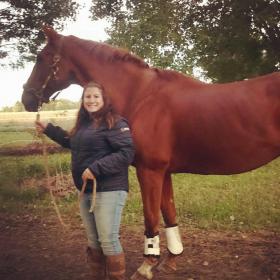This is totally my type of post! You’ve got a lot of great advice here, but I’ll chime in with my personal experience.
My guy is 24 - he’s a former CCI3* eventer (old classification system) and 1.30 jumper. I’ve had him for ~15 years and his needs have changed dramatically. In his older years, these three things that have kept him the most healthy & comfortable are: (1) consistent work; (2) good nutrition; and (3) joint supplements/injections.
My guy never gets a “true” day off. He’s out of his stall every single day moving around. I let him set the pace. If he’s feeling good, maybe we pop over a few jumps or do some lateral work. If not, maybe we do a short hack and a trail ride. If your horse is in your yard and has more space to walk around, that’s even better. Also when we were competing, I was pretty conservative with how often I ran him, which I think helped him in the later years. People think it’s silly that my (very well behaved and well trained) 24 year old horse is in full training, but honestly, since there aren’t any good pasture board options in my area, it’s my best way to ensure he’s getting at least a good hour of moving his body correctly each day.
My horse started losing muscle pretty fast in his early 20s and nutrition was the key to shaping his body up again. Really good quality hay and supplements helped a lot. His muscle tone was better, topline improved, and he had more energy and enthusiasm when being ridden. IMO he needed more protein than he used to. Adding a probiotic to his feed also helped with some digestive issues he started to develop in the last year. I also had to get my saddles refitted (and had to buy a new dressage saddle) because his back had changed so much. It’s something to be cognizant of - you want to give them every chance to be their best self.
Lastly, my horse gets yearly hock injections and monthly Legend. He also gets daily Equioxx and Platinum Performance CJ. This maintenance is expensive, but it makes a huge difference. The day my horse starts to feel uncomfortable in his body despite all this maintenance, I’ll know it’s time for him to phase down. But as long as he seems happy to work, I’ll try my best to support him. As you are well aware, the old guys have a lot to give and teach us 
Regular chiropractic work also helps, but results can vary. I’ve had some chiros I thought were miracle workers, and others who I didn’t think did a damn thing. Back on Track products are also great. I’ve got the mesh blanket and it’s perfect for the wintertime.
Hope this is helpful!


 ) you can usually safely walk them. I find it keeps them fit and limber, and also mentally refreshed.
) you can usually safely walk them. I find it keeps them fit and limber, and also mentally refreshed.
